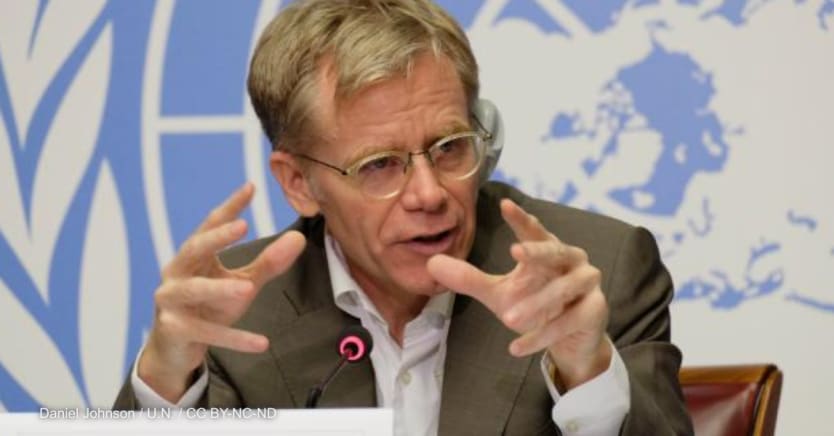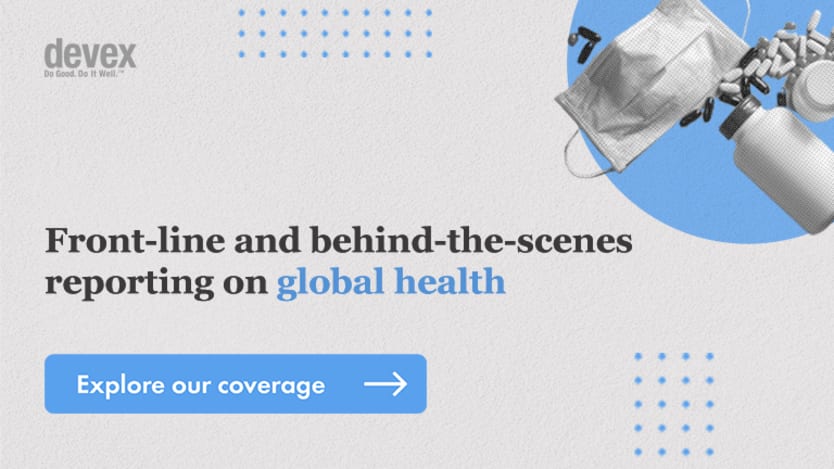
A new review has recommended that the Access to COVID-19 Tools Accelerator, or ACT-A, continue its work in 2022 as long as there’s a critical need for coordinated support to drive access to COVID-19 tools in low- and middle-income countries.
Sign up for Devex CheckUp
The must-read weekly newsletter for exclusive global health news and insider insights.
ACT-A was launched in 2020 as an end-to-end solution to the COVID-19 pandemic via the development of the delivery of COVID-19 diagnostics, therapeutics, and vaccines.
ACT-A prides itself on being an “unprecedented global partnership,” although its work and structure have not always been clear to outsiders. COVAX, its vaccine distribution arm, has also faced criticism and has lately come under fire for not meeting its promises.
This was highlighted in the review released last week, which revealed that it wasn’t always clear to some external stakeholders where ACT-A’s responsibility “began and ended.” It’s also not often clear to low- and middle-income countries what the partnership offers, for which the review recommended actions for improvement. It also recommended that ACT-A partners take a more country-centered approach, and increase engagement with representatives from low- and middle-income countries, civil society, and local communities.
With scarce funding for ACT-A, 'everything moves slower': WHO's Bruce Aylward
The WHO-led COVID-19 access initiative has struggled to raise its target funding. Bruce Aylward, who coordinates the work of the ACT-Accelerator, tells Devex about plans to raise much-needed resources.
In emails to Devex, several ACT-A partner agencies have acknowledged the recommendations, while noting that the partnership has helped accelerate the development and delivery of critical COVID-19 tools amid export bans, supply challenges, and nationalist perspectives. ACT-A has grappled with limited funding and continues to face a deficit of over $16 billion.
But the true test will be in implementation. As it prepares a new strategy within the next 12 months, experts, civil society, and community representatives call for changes in its work — some of which fall outside of the recommendations of the review, such as revising ACT-A’s structure — and it is unclear if it will be taken up by the agencies that make up the partnership.
Decolonizing ACT-A
Fifa Rahman, a civil society representative at ACT-A, told Devex that the mechanism’s key drawback is “the failure to integrate LMIC expertise in equal intellectual partnership.” It also needs to engage more meaningfully with civil society, which she said isn’t just about civil society participation in meetings.
“Meaningful engagement means we get our intellectual input in there from the inception of documents and decisions,” she said. But it’s not always the case, she added. A case in point: ACT-A’s draft strategic plan, which she said had already undergone multiple iterations when it arrived in her inbox last Thursday.
“And that is what we're paying the price for [today], where you have the two track world of the haves and the have nots.”
— Muhammad Pate, Julio Frenk professor of the practice of public health leadership, Harvard UniversityMany argue that engaging experts from the global South and civil society has links to equity, and can also help ACT-A meet its goals. For example, the Africa Medicines Agency shares the same aims with ACT-A in improving the supply and access to medical products in Africa; therefore, collaboration between the two would help synergize efforts to achieve their objectives, said Jackline Kiarie, regional program manager on global health security at Amref Health Africa.
In addition, she said that civil society can ensure COVID-19 tools reach the last mile and vulnerable populations.
“We have already learnt a lot in the response, what works and what doesn’t. This would be useful in the current response as well as in preparing for any other public health threat,” she wrote to Devex in an email.
At this week’s press briefing, Dr. Bruce Aylward, who leads the ACT-Accelerator Hub, said that several approaches will need to be taken to fix this, such as rebalancing the representation in the ACT-A Facilitation Council and analyzing existing engagement mechanisms to determine which ones are not working.
“COVAX has put in place … what they call the AMC Engagement Group that works with every one of the [92] countries that are eligible for that support, but if it's not meeting the needs, we need to fix that. The Diagnostics Pillar has a country engagement roundtable. If that's not working we need to strengthen or fix that,” Alyward said.
A continuing challenge
With COVID-19 tools now available, an emerging key area of focus for ACT-A is to address access inequities to these tools and increase their uptake. A common narrative from ACT-A partner agencies: Efforts must now be intensified to support countries with the distribution and use of COVID-19 supplies.
Kate Dodson, United Nations Foundation’s vice president for global health, said she was pleased to see that building countries’ capacity and readiness to deploy COVID-19 tools was a highlight in the review and thinks this is where ACT-A could bring a “huge value” to countries.
But she added that ACT-A needs to make sure that there are tests, vaccines, and treatments available that can be deployed in a timely manner. That means, she said, ensuring manufacturers are making good on their commitments to ACT-A. This has already proven to be a challenge with COVAX, which had to revise its supply forecast for the year following uncertainties in supply.
A global health expert who requested anonymity as she’s not authorized to speak on the matter said that one can "design" equity into initiatives, “but if demand and supply don't meet, equity becomes a distant ideal.”
Civil society representatives, meanwhile, said that ACT-A needs to broaden the scope of its health systems connector, and not just focus on providing personal protective equipment. Their main ask: for ACT-A to conduct an impact and gap analysis, and make the investment case for the recruitment of additional health workers.
The World Health Organization estimated in May that 115,000 health workers died from COVID-19. Some have resigned or left their jobs to seek better working conditions and pay. In some places, meanwhile, governments don’t have the money to hire more, leaving many unemployed. According to Amanda Banda, global health advocate for Wemos, ACT-A can help bridge the gap in the short-term, and make the case for investments. It’s not about the products themselves, but health workers who will deliver them via a strengthened health system.
Some institutions, such as The Global Fund to Fight AIDS, Tuberculosis and Malaria, are known to champion these in their own programs — The Global Fund focuses on resilient and sustainable health systems, and provides support for the training and salaries of health workers.
“So we don’t understand why … the pillar [has been stuck] in prioritising this,” she said.
Tackling old problems
Amid all these recommendations, funding will be critical.
“[A]t the end of the day, the ACT Accelerator will not be able to deliver on its promises until it receives dramatically more funding,” Dr. Richard Hatchett, CEO at the Coalition for Epidemic Preparedness Innovations, told Devex via email.
WHO’s Aylward said ACT-A will certainly require over $20 billion covering the next 12 months.
Money will be needed to intensify countries’ readiness to deliver vaccines, for continued investments in research and development, and ensure access to oxygen and COVID-19 drugs in low- and middle-income countries, including new ones such as Merck’s antiviral drug molnupiravir, which, if approved by regulators, will be the first oral pill for COVID-19. Unitaid Executive Director Dr. Philippe Duneton said the drug can be “easily produced at low costs,” and that they expect more drugs like it in the coming months.
According to a recent news release, the drug halved hospitalization or death of non-hospitalized adults with mild to moderate COVID-19.
CSOs are pushing for ACT-A to adopt a test-and-treat strategy; further drive down the cost of diagnostics, including rapid diagnostic costs which currently retails in some African countries at about $2.50; and ensure a mechanism for quick access to these medical products. Amref’s Kiarie said: “We can … learn from the HIV & AIDS antiretroviral treatment where delays in access to life saving antiviral treatment caused millions of deaths in the African region.”
But it remains unclear how ACT-A will be able to raise enough resources in the coming months.
“Meaningful engagement means we get our intellectual input in there from the inception of documents and decisions.”
— Fifa Rahman, civil society representative, Access to COVID-19 Tools AcceleratorDr. Muhammad Pate, who is the Julio Frenk professor of the practice of public health leadership at Harvard and was previously engaged in ACT-A when he was the World Bank’s global director for health, nutrition, and population, told Devex ACT-A’s funding challenges are more a reflection of a lack of political consensus to support a global multilateral mechanism, rather than a weakness of the institutions comprising ACT-A.
“There wasn't that global consensus around it [ACT-A]. In reality, if you look at the actions of countries, some key countries in 2020 did not really buy into the idea of a globally coordinated multilateral mechanism. And that is what we're paying the price for [today], where you have the two track world of the haves and the have nots,” he said.
Resources slightly improved in 2021, but more is needed and political leaders in some key countries need to “really walk the talk”, he said.
But what happens after 2022, no one’s sure. Some think ACT-A or something similar will need to be part of the architecture of global health security. But others argue that it’s not the immediate priority.
“We must, for now, focus on delivery and support to countries for the rest of this year and next — then, on this basis, we will be able to discuss the future of the ACT-A,” Duneton said.









